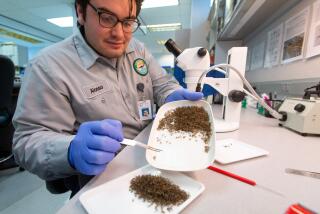Preliminary injunction bars Venice-area dispensary from selling medical marijuana
In a second ruling against a medical marijuana dispensary, a Los Angeles County Superior Court judge issued a preliminary injunction Tuesday that bars a popular Venice-area outlet from selling or distributing the drug at its sprawling store on Washington Boulevard.
The decision by Judge James C. Chalfant could embolden city prosecutors to seek more court orders to close dispensaries as they try to find the most efficient way to reduce the number in Los Angeles. As he did in a previous case, Chalfant concluded that the state’s medical marijuana laws do not allow collectives to sell cannabis.
Chalfant’s decisions are preliminary orders and both cases are slated to go to trial. But his rulings against Hemp Factory V in Eagle Rock and Organica, which straddles the Los Angeles-Culver City line, could eventually force the courts to settle the issue, which has become increasingly contentious as prosecutors in Southern California step up efforts to halt such sales.
Most, if not all, collectives sell marijuana to their members for set prices.
In the hearing, Chalfant strongly reiterated his view that the state’s laws were intended to allow medical marijuana patients and caregivers to form collectives to grow pot together and share the harvest, but not to sell it like a product in a retail store. “Maybe I am too old, but those of us who grew up in the 1960s know what a collective is,” he said.
Asha Greenberg, the assistant Los Angeles city attorney who is handling the case, said Chalfant’s decision should make it clear to the city’s dispensaries that selling marijuana is illegal.
Los Angeles County Dist. Atty. Steve Cooley and Los Angeles City Atty. Carmen Trutanich have pressed that view. Dispensary operators and their advocates, including Americans for Safe Access, the nation’s main advocacy group for medical marijuana, have insisted that the two prosecutors are misinterpreting the law and recent court decisions.
Trutanich has sued four dispensaries: Hemp Factory V, Organica and two Holistic Caregivers stores in South Los Angeles.
David Welch, the lawyer for Organica and its operator, Jeff Joseph, argued that cash contributions for marijuana are just one way that collective members contribute. Both said that members cultivated marijuana on site and in Topanga and Malibu. The judge “has no idea of how we were operating,” Joseph said. “We weren’t getting any from outside sources.”
Welch dismissed Chalfant’s conclusion as merely an opinion. “I think we will take this through the process that, in the end, we will be successful,” he said.
Organica, which registered with the city in 2007, was targeted by federal and local narcotics agents and has been raided three times. In two searches, about 290 pounds of marijuana were seized. Records show the dispensary had $5.3 million in sales in a 13-month period.
The judge compared it to a Costco, which requires membership but no collective labor. He also dismissed Joseph’s claim that he lives a modest lifestyle as “weak,” noting that the California Highway Patrol found more than $92,000 in his car.
And he said Joseph provided no evidence that Organica was nonprofit, as state law requires.
“If I was making money, I wouldn’t be broke now,” said Joseph, who also faces a criminal trial on two dozen felony drug charges.
Chalfant appeared offended by some aspects of the case, concluding in his written decision that Joseph was “simply a drug dealer.”
He noted that the collective members were accused of handing out fliers to high school students. “I personally think that is outrageous,” Chalfant said. Joseph has repeatedly denied the charge, saying that the successful dispensary didn’t need to recruit members.
Chalfant pointed out that the collective’s records showed 257 of its 1,772 members were 21 or younger.
“How many of the children who are members of Organica are seriously ill?” he asked Joseph’s lawyer.
Welch replied: “Your Honor, I know 16-year-olds who have died of cancer.”
Chalfant’s written decision closely resembles the one he issued for Hemp Factory V on Jan. 29. At one point in Tuesday’s hearing, the judge said, “As you can tell, I did some cutting and pasting.”
But Chalfant denied Greenberg’s request to require Organica to comply with the state drug-labeling law. In the Hemp Factory V case, he granted that request because evidence showed the dispensary sold pesticide-tainted pot.
Joseph said Organica has not been open since the last raid, in February. “Of course not,” he said. “I’m law-abiding as much as possible.”
He said he is considering whether to open a different business at the location on Washington Boulevard. “I want to make something else there nonprofit to show that it is about the community,” he said. “If we move out, it will fall into disrepair.”
More to Read
Sign up for Essential California
The most important California stories and recommendations in your inbox every morning.
You may occasionally receive promotional content from the Los Angeles Times.










